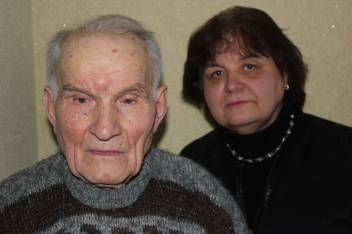 I came across this story as I am currently with our Affiliate in Ukraine…a shocking and timely story for today’s World Day of Social Justice. This year’s theme is “ending human trafficking and forced labour”.
I came across this story as I am currently with our Affiliate in Ukraine…a shocking and timely story for today’s World Day of Social Justice. This year’s theme is “ending human trafficking and forced labour”.
Talking to refugees from the war in eastern Ukraine, Larissa described fleeing Debaltseve, in the middle of a fierce battle, how her home had been shelled and she and her daughter were now homeless. They’d moved in with her father in Sloviansk in government-controlled territory but still close to the fighting.
Forced to work
Pavel, 87, was sitting quietly in a corner listening to his daughter. Gradually he began to tell his story. He said that he and two friends had been arrested by German soldiers in Ukraine in 1942. One of them was killed while being interrogated and the other two were taken to southern Germany and forced to work in an aeroplane factory in Augsburg. He was fourteen years old.
As the war progressed, he was moved further west until he ended up in Dachau concentration camp, near Munich, where he spent two years.
In the Donbass region of non-government controlled Ukraine, it’s estimated there were 4,500 people, mainly women, who were victims of forced labour during the Second World War.
Subject of experiments
Today, World Day of Social Justice, Pavel’s story is a poignant reminder of this year’s theme “ending human trafficking and forced labour”.
“While we were there we were the subject of experiments. We were injected with malaria and typhus and then treated. When the American army liberated us, I couldn’t go out to greet them because I had typhus,” he said.
“The army doctors saved my life. They took me to hospital in an ambulance. I wouldn’t be here today without them.”
Pavel shared his block with 450 people from several different nationalities and out of a workforce of 600 in the factory, only 82 survived.
But when forced labourers returned home after the war, many were condemned as collaborators and exiled to camps or to work in heavy industry.
Support to victims of forced labour
Under post-war reparation schemes, Germany made payments to many victims of the Nazi regime. Turbota pro Litnix v Ukraini (TLU), HelpAge’s Affiliate in Ukraine, has been administering the programme financed by the German Federal Fund to provide social support to victims of forced labour since 2007.
Pavel said he used to run the Sloviansk branch of the non-governmental organisation Victims of Nazi Forced Labour, in eastern Ukraine, but now his daughter has taken over the reins.
From such a difficult start in life, Pavel went on to marry, have children and had a long career working in a ceramics factory. But he was clearly troubled by the current war. “We never expected this,” he said. Sloviansk was taken over by armed groups last summer but Ukrainian forces drove them back. There were signs of shelling all over the city.
Pavel said he’d been back to Dachau once for a reunion and showed me photos of people who’d been there with him. When I told him I’d visited Dachau in the 1970s, he became very emotional and asked lots of questions. His memories were clearly still vivid.
When I asked him how he had survived, he said he didn’t know.
“It was a miracle.”
Find out more about the situation of older people in Ukraine.
